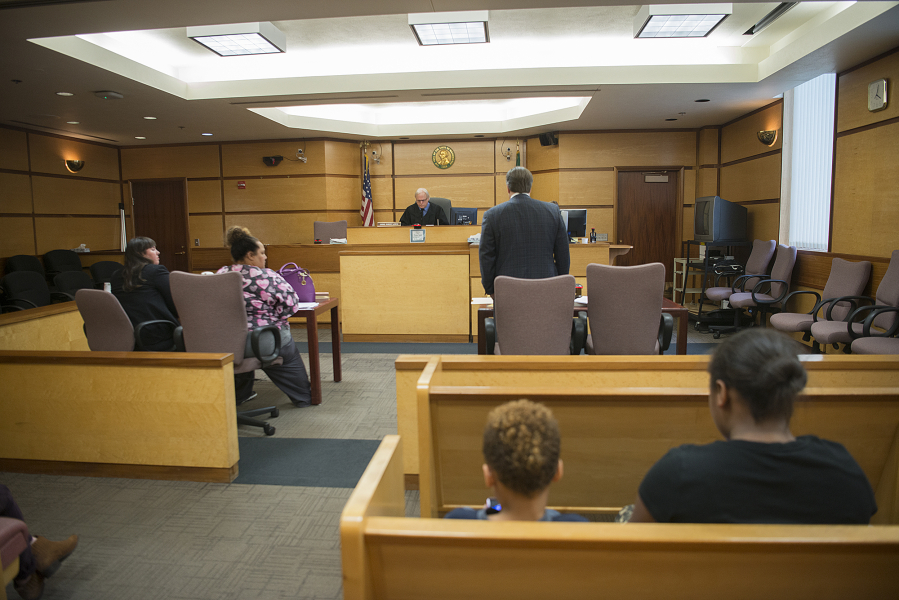A man in the third row of benches is dozing, his soft snores occasionally jolting him awake. Fluorescent lights buzz overhead.
It seems dull, but lives change in this courtroom, where every Friday a Clark County Superior Court judge hears the unlawful-detainer docket.
The vast majority of renters facing unlawful-detainer lawsuits, or evictions, lose their cases. They are ordered to pay back rent, late fees and the landlord’s attorney costs. Once the order is recorded and they vacate, future landlords will be less willing to rent to them.
On Friday, Oct. 13, it’s Judge John Fairgrieve’s turn to preside.
People facing evictions have to check in with the judge by 9 a.m., then many seek free legal advice from the Clark County Volunteer Lawyers Program’s Housing Justice Project.
The program’s executive director, Elizabeth Fitzgearld, observes the proceedings. She says this docket is small at just 11 cases. The unlawful-detainer dockets were longer in 2012 and 2013 as the area struggled to climb out of the recession.
When Fairgrieve plugs the volunteer lawyers program, one man steps forward. He leaves for the program’s workroom on the third floor.
A lot of people don’t show up to eviction court “because they’re terrified,” Fitzgearld says. Or, they ignore the court documents asking them to answer to the complaint and summoning them to court.
“They think ‘I’m not really served if I don’t respond,’ ” Fitzgearld says.
If tenants don’t answer and don’t show up, then they’re not in compliance with the court’s order. And, by default — within minutes, or seconds — the judge accepts the complaint. They lose. They’re evicted.
Today, that happens to one tenant who didn’t answer the complaint and doesn’t show. The landlord’s attorney presents his case, and Fairgrieve signs off on a writ of restitution. Now the tenant faces many costs, and the Clark County Sheriff’s Office civil division may forcibly remove the tenant from the rental unit.
On to the next case.
Lack of understanding
In a typical case, there’s no question that defendants haven’t paid their rent, putting them at an immediate disadvantage. And unlike in criminal cases, defendants in civil cases are not guaranteed an attorney if they can’t afford one, so many represent themselves. They often show a lack of understanding of landlord/tenant law and how the legal process works.
One man faces ejection from a place that his ex-wife rents with their two children. He says he lives in Portland but visits the house frequently to see his children. A couple of times he asks the judge for legal advice and asks whether he’d like to read a letter from his son about the situation or talk to the boy.
“No, I do not want to hear from your son about this,” Fairgrieve says. After much back and forth, he concludes: “You’re not on the lease, so you don’t have a legal right to be there.”
Two Recent Eviction Cases
How they moved through Clark County Superior Court:
Case No. 1
• Aug. 29: Three-day notice to pay or vacate posted for tenant behind on several months of partially paid rent.
• Sept. 5: Complaint filed in court with response due by Sept. 21. Tenant fails to respond.
• Sept. 22: At the unlawful-detainer court hearing, a writ of restitution is ordered.
• Oct. 11: Tenant evicted; writ satisfied.
Case No. 2
• Aug. 6: Three-day notice to pay or vacate posted for tenant who failed to pay August rent.
• Sept. 1: Complaint in court filed with response due by Sept. 14.
• Sept. 13: Tenant submits response.
• Sept. 15: During the unlawful-detainer court hearing, a writ of restitution is ordered.
• Oct. 2: Tenant evicted; writ satisfied.
SOURCE: Clark County Volunteer Lawyers Program
What the man doesn’t seem to get, Fitzgearld says, is that he will have an ejection on his record for a place he doesn’t rent. If he tries to move elsewhere, screening agencies will see that he got ejected from a property. (It’s like being a squatter.)
Another tenant — the one who sought advice from volunteer lawyers — says he hasn’t paid rent for months because there are habitability issues such as mold, water damage and a leaky roof. He says the landlord told him he could live rent-free until the repairs were made, as long as he didn’t complain to the health department.
Fairgrieve says the tenant didn’t comply with Washington law, which requires written notice of deficiencies.
People inaccurately think they can withhold rent if there are things that need to be fixed, but that’s not going to hold up in court, Fitzgearld says.
In another case, tenants on a month-to-month rental agreement claim that after they requested the front door be replaced, their landlord got mad and gave them a 20-day notice to vacate. They say they were told that if they stayed there less than a year, they would forfeit the deposit, so they feel they’re being deceived. If they would have known they’d get kicked out after living in the house for 10 days, they would not have moved in, they said.
Forfeiting the deposit is an incentive for tenants to stay longer, not a requirement for the month-to-month rental agreement, Fairgrieve says. And there’s nothing in the contract about fixing the door. Fairgrieve says people should not sign contracts that they don’t agree with. Oral agreements undermine contracts; that’s why people are bound to the terms of a contract.
Fairgrieve also calls out the tenants for not reporting the perceived retaliation to authorities or citing the correct Washington statute during their argument. Still, he’s going to return to their case to figure out whether there was retaliation and, if so, what the remedy is.
At the end of the docket, one guy discovers he’s missed his own hearing in another courtroom. People often go to the wrong courtroom or get sent to the wrong one by someone at the courthouse’s information desk, Fitzgearld says. That includes people who are on the unlawful-detainer docket and, by default, are evicted when they don’t show.
It’s frustrating to watch, Fitzgearld says. People arrive at the Clark County Volunteer Lawyers’ workroom in tears because they’ve missed their court hearing.
Some landlord attorneys have a relationship with the program and will refer tenants. It’s easier for a lawyer to talk with another lawyer, rather than a tenant. Volunteers can try to negotiate more time for the tenant to move out and defuse the situation.
In effect, they can curb some homelessness. And, next Friday, they’ll try to do the same.




